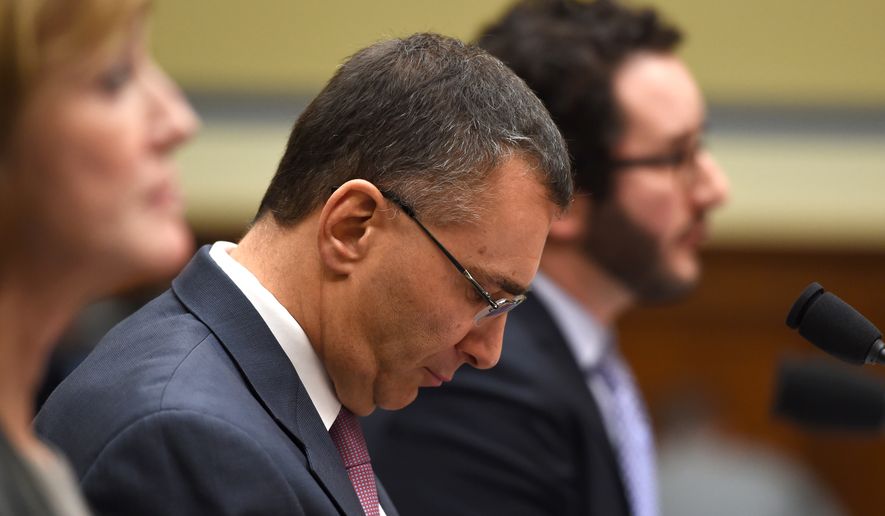Jonathan Gruber said Tuesday he was glib, insulting and speaking well beyond his abilities when he called American voters stupid and said Obamacare backers had to game the system to get the law passed.
But he also denied he was its architect, or even a very important part of the health care conversation.
Mr. Gruber’s caught-on-tape comments have been a political nightmare for an Obama administration trying to recover from a botched rollout of the exchanges last year. The Massachusetts Institute of Technology economist said his remarks were unfortunate but shouldn’t sour consumers looking for a better deal on their insurance, nor should they be evidence in a pending Supreme Court case that could topple one of the health law’s pillars.
“I behaved badly, and I will have to live with that, but my own inexcusable arrogance is not a flaw in the Affordable Care Act,” Mr. Gruber told the House Committee on Oversight and Government Reform.
In a combative four-hour hearing, he refused to say how much money he’d been paid in total by states or the federal government to consult on the health law, telling the oversight committee they could take that up with his lawyer later.
And under intense questioning, he admitted that his economic modeling — the area where he said he does have expertise — predicted that some Americans would lose their existing insurance plans. President Obama had emphatically and repeatedly denied that this would happen in the runup to the bill’s passage.
SEE ALSO: Jonathan Gruber to face hostile House panel, tea party ‘I’m with Stupid’ T-shirts
Committee Chairman Darrell E. Issa, California Republican, balked at Mr. Gruber’s attempts to rein in the scandal, saying his remarks were inadvertently truthful and pulled back the curtain on Obamacare, which Democratic majorities muscled through Congress in 2010.
“Are you stupid?” Mr. Issa asked at one point.
“I don’t think so, no,” Mr. Gruber replied.
Even Obamacare’s supporters lambasted him Tuesday for gifting the GOP another weapon in their fight against the law.
“Man, you did a great job. You wrapped it up with a bow,” said Rep. Elijah E. Cummings of Maryland, the panel’s top Democrat.
Among the comments that have come to light, Mr. Gruber said the law was written in a “tortured” way to game budget rules so as not to be declared a tax increase by the Congressional Budget Office and thereby obscure its impact from the public.
“Lack of transparency is a huge political advantage,” Mr. Gruber said in one clip. “And basically, call it the stupidity of the American voter or whatever, but basically that was really, really critical to get the thing to pass.”
Mr. Gruber apologized repeatedly Tuesday and ducked fierce debate with GOP lawmakers by saying he is not a politician.
“Most of the people watching this morning aren’t politicians, and they don’t call people ’stupid,’” said Rep. Trey Gowdy, South Carolina Republican.
Mr. Gruber tried to clarify remarks that suggest Obamacare subsidies should only help customers of state-run exchanges.
A lawsuit before the Supreme Court makes that same argument, and if the challengers are successful, it could seriously dent the health care law by cutting off the tax credits to about two-thirds of the states, which use the federally run exchange.
Mr. Gruber said he was speaking hypothetically about what would happen if the Obama administration, “for whatever reason, might not create a federal exchange.” If that happened, the only way states could be sure that their residents would get tax credits would be to set up their own exchanges, he told the committee.
Testifying alongside Mr. Gruber was Marilyn Tavenner, administrator for the Centers for Medicare and Medicaid Services, who said it was “regrettable” that her agency included 400,000 dental plans with the enrollment figures it reported to the committee earlier this fall.
When the dental plans were excluded, Obamacare enrollment fell to 6.7 million in the first go-round, or less than the 7 million target the Congressional Budget Office had estimated.
Mr. Issa said it took his staffers just 20 minutes to find the error once the administration sent the correct documents over to the committee.
“Simply put, this was a mistake,” Mrs. Tavenner said. “Moving forward, only individuals with medical coverage will be included in our individual affected enrollment numbers.”
• Tom Howell Jr. can be reached at thowell@washingtontimes.com.




Please read our comment policy before commenting.